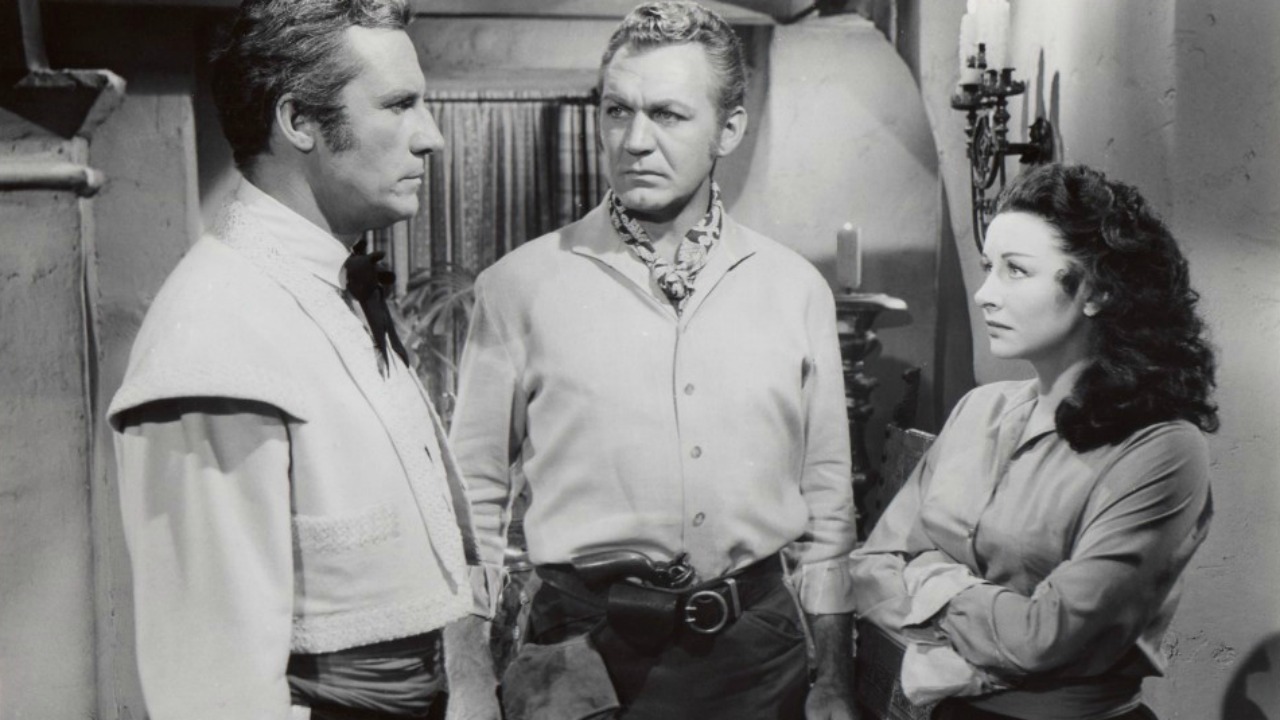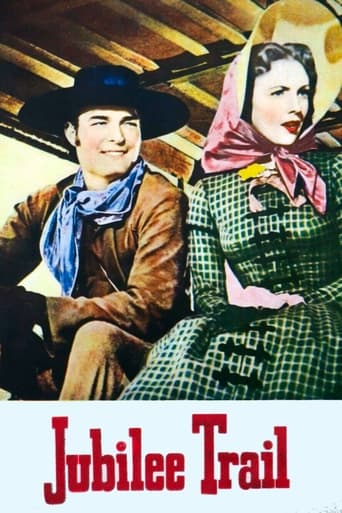



Who payed the critics
Instead, you get a movie that's enjoyable enough, but leaves you feeling like it could have been much, much more.
View MoreThe movie's not perfect, but it sticks the landing of its message. It was engaging - thrilling at times - and I personally thought it was a great time.
View MoreA film of deceptively outspoken contemporary relevance, this is cinema at its most alert, alarming and alive.
View MoreUnusual and charming western, though it is really more of a romantic costume film. The sets and costumes are glorious, as others have noted. Very unusual color combinations for the ladies. Great authenticity to the sets. Lots of Spanish being spoken, without translation. The acting is good and the story is not at all the usual wagon train picture. I did not care so much for all of the singing. It was a little distracting. Filler if you will. But the romance was good. It was kind of an old fashioned melodrama actually. Well just watch it, but do not have expectations ahead of time because it is not at all what you would expect.
View MoreJubilee Trail represented one of the last attempts of Herbert J. Yates to get the American movie public to accept his wife Vera Hruba Ralston as a star. Again she didn't score with the public and pretty soon Vera and Republic Pictures were history.Actually Republic Pictures really ended the day that John Wayne got shed of his long term contract with Republic. Yates made more money loaning him out to other studios than he did with the films that actually starred the Duke. After all, Duke's loanout services were pure profit, no overhead expenses involved in producing high budget epics that befit his growing star status.John Wayne couldn't have saved Jubilee Trail because the central characters here are two women, Vera and Joan Leslie. Vera's running from a mysterious past in New York and she hooks up with Joan and her new husband John Russell. Russell is traveling west with a pack train of supplies for he and his brother Ray Middleton. Russell also has a past himself that involves some kanoodling with the owner of a local ranchero and a small bundle of joy he only finds out about just as he's starting west.Middleton's real upset about the marriage as they've ruined plans for a merger between the two families. He takes an unreasoning dislike to Joan Leslie and is determined to gain control of the child she's carrying now after Russell is killed.It really is more soap opera than horse opera. There's an Indian attack sequence, but I'm sure it's in there so western fans can have a little action. There's also a nice gun battle between Forrest Tucker and two bad guys in Middleton's employ looking to steal Leslie's child after it's born. Middleton is the kind of villain you are more likely to see on daytime soaps.Tucker has the hero role, but he really does little between the action sequences but look solemn and declare his love for Leslie. Pat O'Brien has a supporting part as a cashiered army surgeon who drinks to forget his troubled past. And presiding over it all once they reach California is Vera at Jim Davis's saloon.Vera's got the Marlene Dietrich part here, but Jubilee Trail would have been a whole lot better if Yates had gotten Marlene Dietrich for the part.
View MoreJUBILEE TRAIL is close to a disaster, and it particularly distressing to see lovely and very talented JOAN LESLIE reduced to a namby-pamby secondary role to the awful Vera Ralston. Ralston, of course, was a stellar Olympic figure skating champion who arrived in Hollywood to skate her way into a couple of films for Republic Pictures' boss Herbert J. Yates (who fell in love with her, married her, and spent years and money on trying to convince the public that she could act.) Ralston's acting was poor but less annoying in those films in which she was surrounded by professionals (e.g. MURDER IN THE MUSIC HALL and ANGEL ON THE AMAZON). But Yates kept pushing the envelope, and Republic's expensive western JUBILEE TRAIL is one of the nadirs. Lots of money obviously spent on the film, but Ralston, as a 'dance hall' performer (hmmm) is all over the place with shrieky acting techniques, an overabundance of makeup, and a plump-ish body. It is truly one of the lowest acting exercises. Photography, though, is quite good, and Yates' money expenditures are obvious in other facets of the production. John Russell is the best in a large supporting cast. Joan Leslie remains the central character around whom the plot is moved along. She is beautiful and tries to do the best with some of the awful dialog. (She plays a nice newlywed who, for some unfathomable reason, befriends Ralston.). What a waste!!! If life were fair, Leslie, by this time, would have been an appreciated talent whose abilities were growing with her own maturity.
View MoreI like this movie. The slow pace is an asset rather than a liability. Although the cast is not particularly well-known, there is a delightful mix of characters in this better-than-usual Western. The movie is rather faithfully based on Gwen Bristow's romantic novel about early California.The interior sets are the real stars of this film. From 1845 New Orleans to pre-Mexican War Santa Fe and Los Angeles the sets are very colorful and lavish. Joan Leslie, Vera Ralston and the rest of the cast work hard to brighten up the sets.There is an aura of pleasant reality about this film. The characters generally are dressed in period clothing and carry vintage weapons. There is a refreshing variety in the clothing worn by the male characters, particularly in the hats. The wardrobes of Leslie and Ralston are as lavish as the sets. The only disappointment is the standard backlot Western town set which pretends to be Los Angeles. This set has appeared in countless Westerns and it looks oddly inappropriate here.Much of this film occurs indoors. There is also little action. However, the great sets and script more than compensate. The acting is generally very good and the cast does a wonderful job with the characterizations. Vera Ralston does justice to her role as Florinda, a woman with an awful memory in her past. Joan Leslie's performance as a woman stranded in California by the untimely death of her husband is also far above standard. Forrest Tucker's role as John Ives is uneven. In some scenes he speaks his lines with a whisper. However, he more than compensates by handling himself well in the film's action scenes. Jack Elam has a bit part as a bad guy. Although he says only three words, he exudes evil in his brief appearance.Normally, a slow pace is the kiss of death for a Western, but in this case the glacial pace works in its favor. Rather than hoping that something will happen, the viewer may find himself or herself wishing it won't end. This is a film that seems longer than it really is, and I wish it had been a little longer. I'm always sorry to see the end credits.Victor Young's score is rich and vibrant. Although far from his best work, songs like "Jubilee Trail" are very enjoyable. The music for this film is not as overpowering as the music in Westerns like "The Big Country" and "The Magnificent Seven". In one scene the haunting melody of "Jubilee Trail" is played with strings and is almost inaudible as the mule train crosses the desert toward California. The brief cue which heralds the arrival of the pack train from California in Santa Fe effectively communicates the excitement of the moment. The only really loud song is Vera Ralston's song in the Los Angeles saloon. In this case the loud song is appropriate, because they are celebrating the expected birth of Garnet's (Joan Leslie) baby. As Western scores go this one stands out because it is different.This film is now available on video and is well worth watching. You might find yourself watching it over and over again as I do.
View More